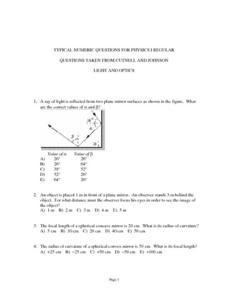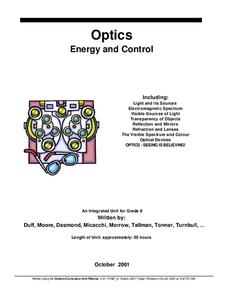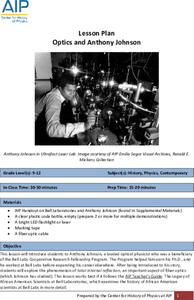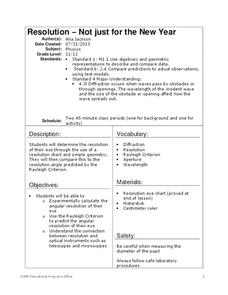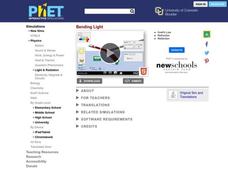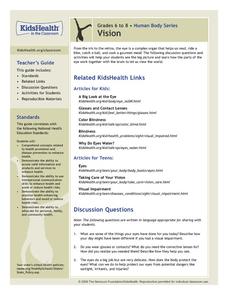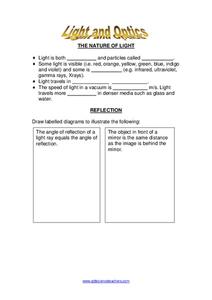University of Minnesota
Blind Spot
Your eyes each work independently, so how do we only see one image? The quick hands-on experiment encourages young scientists to test their blind spots on each eye individually. After learning where the blind spot is and why it exists,...
Cornell University
Shedding a "Little" Light on Cancer Surgery
Many types of cancer treatments now depend on nanotechnology—a big "little" discovery. Scholars begin by removing "malignant" tissue from simulated brains, one using fluorescent markers thanks to nanotechnology and one without. This...
Institute of Electrical and Electronics Engineers
Telescoping Periscope
Ahoy, matey! Here is an engineering expedition that mini mariners are sure to be swept away by! After reading a brief description and history of periscopes, they work in crews to construct one. Use this activity to enhance a...
Curated OER
Typical Numeric Questions for Physics I - Light and Optics
Nineteen word problems dealing with frequency, speed, reflection, and refraction of light are provided here. Empower your physics masters to manipulate equations for computing angles, focal lengths, image heights, and more! This is a...
Curated OER
Solar Electricity ~ The Colour Sensitivity of a Photovoltaic Cell
Teacher's notes, a materials list, detailed procedure, tips, and extension ideas are all included to make teaching this lesson plan on photovoltaic cells a sunny spot in your day! After some brief background reading, physical science...
Curated OER
Energy and Control
Students investigate the question, "how does understanding the properties and characteristics of light help us to enhance our quality of life?". They apply knowledge gained though the unit in order to create an optical device.
American Institute of Physics
Optics and Anthony Johnson
Message sending has come a long way since the days of Morse code's dots and dashes. Young scientists study the research of optical physicist Anthony Johnson and his work in fiber optics, lasers, and the principle of total internal...
American Institute of Physics
The Black Scientific Renaissance of the 1970s-90s: African American Scientists at Bell Laboratories
A two-part instructional activity asks young scientists to research the contributions of African American scientists at Bell Laboratories. After presenting their findings, class members watch two demonstrations that introduce them to...
NASA
Build a Relay Inspired by Space Communications
Learn how the professionals at NASA send information across space. Engineers use a microdevice, laser pointer, and mirrors as relays to model data transmission in space. Scholars program a microdevice to detect light received and test...
Cornell University
Beam Focusing Using Lenses
Explore optics using an inquiry-based experimental approach! Young scholars use a set of materials to design and build a unit capable of focusing a beam of light. They experiment with different lenses to determine the best approach to...
Cornell University
Optical Simulation of a Transmission Electron Microscope
Don't have an electron microscope? Have your classes build the next best thing! A hands-on lesson asks scholars to build a model of Transmission Electron Microscope (TEM). They then use their models to identify the function of each...
Cornell University
Resolution—Not Just for the New Year
Experiment with optical resolution using an inquiry-based lesson. Young researchers calculate fellow classmates' optical resolutions. They apply the information to understand the inner workings of optical instruments.
PHET
Geometric Optics
What would happen if your entire world was flipped upside down? In addition to changing the distance and size of an object, lenses flip the image upside down. The simulation allows scholars to vary the object, move the object, move the...
PHET
Bending Light
Different colors of the spectrum travel at different speeds through media, causing them to refract at different angles—which allows humans to see their colors. Through a simulation, pupils see how air, water, and other media bend light....
Teach Engineering
Bubbles and Biosensors
Bubbles aren't just for children. In the third installment of a seven-part series, teenagers use bubble solution to create bubbles and observe patterns of refraction on the bubble surfaces. Application of this concept to thin films in...
Teach Engineering
What Does Light See?
The second installment of a seven-part series focuses on the refraction of light and how it affects the colors we see. Learners consider how this concept connects to biosensors for cancer detection.
Jefferson Lab
Optics: Mirrors and Lenses
Did you see that or did I imagine it? Optical illusions are often created with mirrors and lenses, and here is a presentation that covers many different types of mirrors and lenses and how they work. Flat, concave, and convex mirrors, as...
Curated OER
Light and Geometric Optics
It's time to see the light with a unit that focuses on light and geometric optics, including concave and convex mirrors. A variety of experiments, worksheets, and online activities are included.
Nemours KidsHealth
Vision
From the iris and retina to glasses and contact lenses, learners will be excited to see what activities are in store for them as they learn about the complex organ of the human eye.
Curated OER
Light, Colors, and Vision
Third graders experience optic illusions by creating flipbooks. In this optics lesson, 3rd graders view a demonstration of the workings of rods and cones using a camera. They are shown an optical illusion and work to create their own...
Curated OER
Light and Optics
In this science worksheet, students look for the words to fill in the crossword puzzle that is focused upon the concepts of light and optics.
Curated OER
Light and Optics
For this light and optics worksheet, 11th graders fill in 7 blanks about the nature of light, draw 9 diagrams to illustrate reflection, refraction, lenses and color.
Curated OER
Review of Optics
In this optics review worksheet, students complete 50 multiple choice questions on light reflection, diffraction and interference.
Curated OER
Waves Interference
Students identify different wave types and their characteristics. In this wave lesson plan students complete activities by activating tuning forks and interpreting data.





